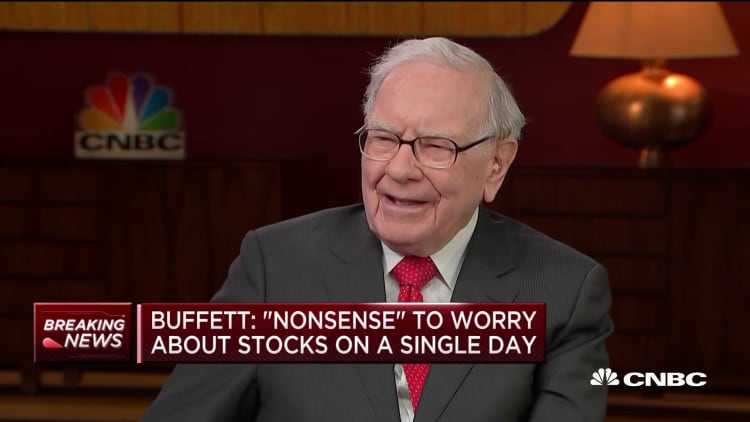The U.S. stock market has seen remarkable change over the last 34 years between the meteoric rise of low-cost passive investing, algorithmic trading and the real-time digitization of financial filings.
But Wall Street's most revered investor, decades later, is still touting the same advice.
In one of Warren Buffett's first televised profiles, the "Oracle of Omaha" explained a simple method of investing that prioritizes an insatiable hunt for bargains, patience, and the occasional baseball analogy. A video of the interview circulated on Twitter on Monday after being shared by user Lyall Taylor.
"In the securities business, you literally every day have thousands of the major American corporations offered to you at a price and at a price that changes daily. And you don't have to make any decisions. Nothing is forced upon you. There are no called strikes in the business," Buffett said.
"They may be wonderful pitches to swing at, but if you don't know enough, you don't have to swing. And you can sit there and watch thousands of pitches and finally you get one right there where you want it ... and then you swing," he continued.
If Buffett's advice from PBS's "Adam Smith's Money World" more than 30 years ago rings a bell, it's likely because he's hardly changed his tune over his many profitable years on Wall Street.
Berkshire Hathaway has posted average annual returns of 17.1% since 1985, well ahead of the broader stock market's 10.5% including dividends. If you'd invested $10,000 in Berkshire Hathaway at the start of 1985 you'd now have $2.4 million; the same principal in the S&P 500 would now be worth about $227,000.
'No called strikes'
In one part of the 1985 interview, Buffett explains that the key to good value investing is about exploiting one's "area of competence" in determining the real value of a business. Then, taking advantage of one's expertise in a group of stocks, an investor can sometimes find upside opportunities when the market prices the securities below their actual worth.
Fourteen years later, at Berkshire Hathaway's 1999 stakeholder meeting, Buffett would tell investors that "different people understand different businesses. And the important thing is to know which ones you do understand and when you're operating within what I call your 'circle of competence.'"

"There are all kinds of things I'm not competent to value ... There are few I am competent to value," Buffett said in 1985. "There are all kinds of things I don't know about, and that may be too bad, but why should I know all about them?"
Buffett, the chairman and CEO of Berkshire Hathaway, has served as a model for a generation of investors with a frugal, bargain-based buying strategy stemming from his education under "Father of Value Investing" and Columbia professor Benjamin Graham.
CNBC has decades of Berkshire Hathaway meeting transcripts and interviews with Buffett himself in its Buffett Archive.
In addition to inspiring legions of value investors across the globe, Buffett's investment philosophy also contributed to his immense personal wealth of over $80 billion, according toForbes. Though the sum makes him the world's third richest person behind Amazon CEO Jeff Bezos and Microsoft founder Bill Gates, Buffett has pledged to donate more than 99% of his worth to charitable causes.
'You don't need tons of IQ in this business'
While Buffett has long credited his focus on his own "circle of competence" for his success, he also tends to invest in companies with minimal debt, reliable cash flows and sounds management teams. He also told "Money World" host George Goodman in 1985 that a good investment manager isn't a necessarily a genius, but someone with a calm disposition.
"You don't need tons of IQ in this business. I mean, you have to have enough IQ to get from here to downtown Omaha, but you do not have to be able to play three-dimensional chess," Buffett quipped.
"You need a stable personality," he continued. "You need a temperament that neither derives great pleasure from being with the crowd or against the crowd because this is not a business where you take polls. It's a business where you think."

Another investment tenant the 89-year-old has touted throughout his career is remembering to think about each holding as proof of ownership.
"Most of the professional investors focus on what the stock is likely to do in the next year or two. And they've all kind of arcane methods of approaching that, but they do not really think of themselves as owning a piece of a business," Buffett told Goodman.
"The real test of whether you're investing from a value standpoint or not is whether you care whether the stock market is open tomorrow," he explained. "If you're making a good investment in a security, it shouldn't bother you if they closed the stock market for five years."


